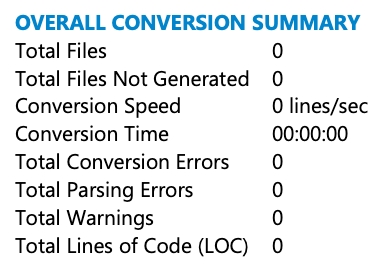Overall Conversion Summary
This section shows the overall conversion summary
This is a deprecated version of the SnowConvert documentation, please visit the official site HERE.

Total Files
Represents the number of files discovered in the input address and that were successfully migrated by SnowConvert.
CSV Associated field name
TotalFiles
Sample
Expected Total Files: 1
Explanation: With the previous sample, we will only have the SQL file as valid for migration, as the other two files have an extension that SnowConvert cannot recognize.
SQL Files
This is the number of files detected in the input folder that have an extension of .sql, .ddl, or .dml.
CSV Associated field name
SqlFileCount
Sample
Expected SQL Files: 3
Explanation: In this case, the 3 files with extensions DDL, DML, and SQL are recognized as SQL Files. Other extensions are not counted for SQL Files. Teradata script files are not counted for SQL files, those are counted for Script files.
Script Files
This is the number of files in the input folder that are of the following type:
BTEQ: .bteq, .btq
FastLoad: .fload, .fl
MultiLoad: .mload, .mld, ml
TPump: .tpump, .tp
TPT: .tpt
CSV Associated field name
ScriptFileCount
Sample
Expected Script Files: 6
Explanation: In this case, the 6 files with extensions with Script file extensions are recognized as Script Files. The 2 extensions for BTEQ files previously mentioned are counted but the SQL file is not counted because it is a SQL File.
Total Files Not Generated
Represents the number of files found in the input address that, because of a failure in SnowConvert, failed to generate the migrated output file.
CSV Associated field name
TotalFilesNotGenerated
Sample
Expected Total File Not Generated: 1
Explanation:
Conversion Speed
Represents the number of lines processed per second during the migration.
Formula
CSV Associated field name
ConversionSpeed
Sample
Expected Conversion Speed: 4 lines/sec
Explanation: Let's say that the example execution time was 2 seconds, taking into account that the number of lines is 8. Applying the formula 8/2 = 4, so the Converting Speed is 4 lines per sec.
Conversion Time
Represents the duration of SnowConvert's migration.
CSV Associated field name
ElapsedTime
Total Conversion Errors
The total count of conversion errors that occurred during the conversion process. This type of error could be related to file I/O, memory management, or any abnormal situation that cannot be handled by SnowConvert. These are unhandled code exceptions and are considered critical issues.
CSV Associated field name
TotalConversionErrors
Total Parsing Errors
The total count of parsing errors that occurred during the code analysis process. A parsing error occurs when the parser (the component that reads the source code files) encounters something unexpected. This usually means a syntax error, which refers to a code element in the file that did not match the SQL grammar specification that the parser was expecting. In other cases, these errors can also occur because the parser is not yet ready to support a specific grammar. Parsing errors are also considered critical issues. If this number is high in relation to the migration workload size, input code revision is advised.
CSV Associated field name
TotalParsingErrors
Sample
Expected Total Parsing Errors: 2
Explanation: The first table presented doesn't have a parsing error, all of it grammar is correct, but the two following statements present parsing errors because they have a grammar problem, like the second table that the CREATE has a spelling mistake, or the double FROM on the SELECT of the view.
Total Warnings
The total count of warnings that SnowConvert generated for the given input. A warning is inserted when the translation of a specific element is mostly functionally equivalent but there are some corner cases in which some user intervention might be required. They have low severity because their intention is to provide information that can be reviewed if the code shows any kind of functional difference when executed on the target platform.
CSV Associated field name
TotalWarnings
Sample
Expected Total Warnings: 3
Explanation: In the last example, there is a type of warning in all three statements.
Total Lines of Code (LOC)
The total number of lines of code in the input files, that were processed by the conversion tool.
CSV Associated field name
TotalLinesOfCode
Sample
Expected Total Lines of Code(LOC): 8
Explanation: Although the file shows 10 lines, the valid code lines are 8, because blank lines are not counted.
Last updated
